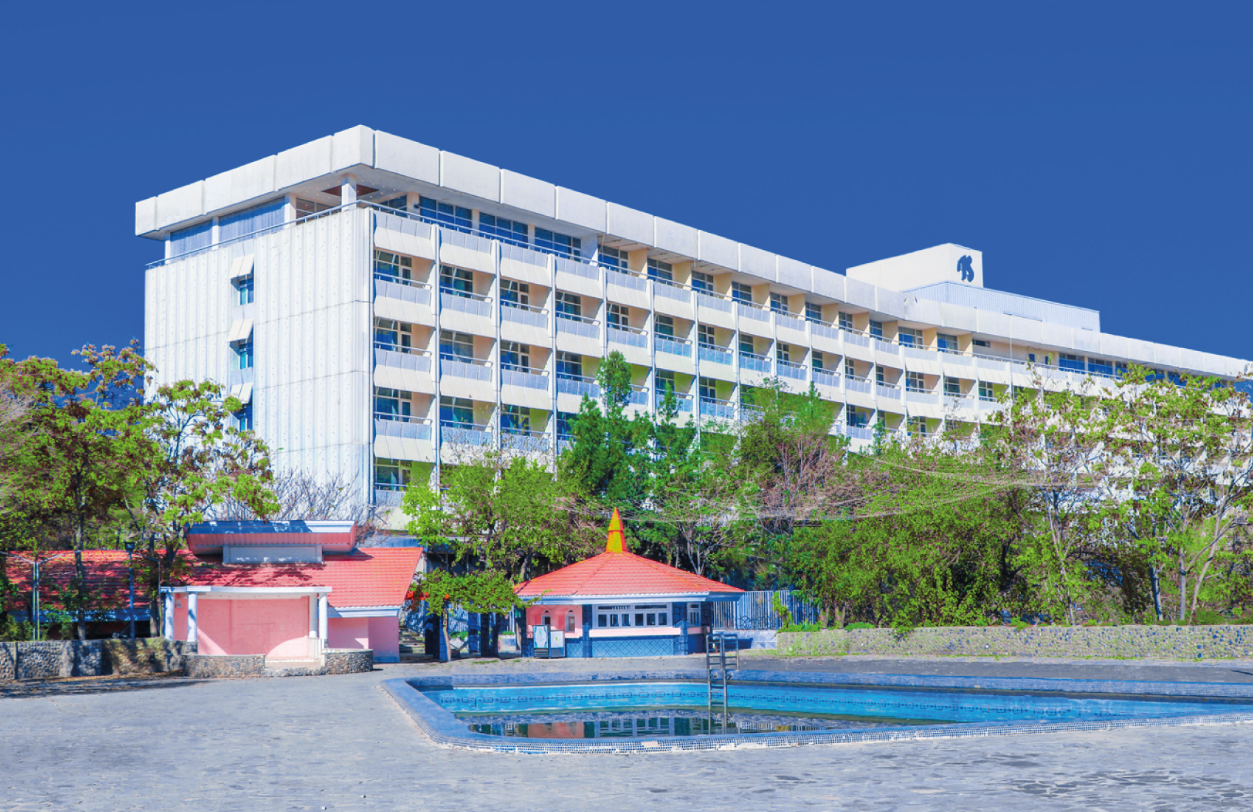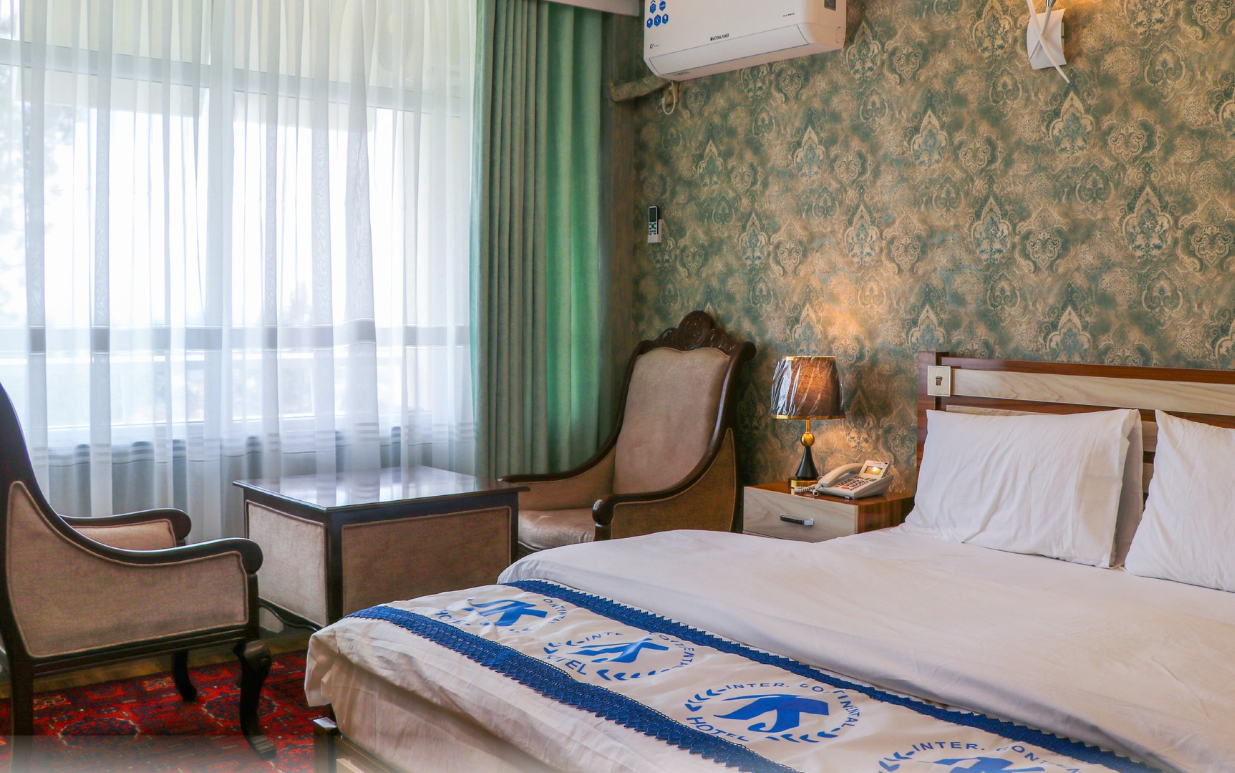Like the old Sheratons in Baghdad and Basra, the Intercontinental Kabul continues to use the name of a major brand though it has no actual affiliation. They don’t offer IHG Rewards points or honor the free minibar benefit for top status customers.
Now owned by the Taliban, it’s running at 20% occupancy. Only half of the hotel’s chandeliers are turned on, to save electricity. The property’s HR manager has an M4 assault rifle and a Glock, and has bomb making skills.

Credit: Intercontinental Kabul
When the Taliban stormed Kabul they took the hotel, lodged fighters there, and stole computers. But within two days they called male hotel staff back to the property in order to re-open the hotel. The only women allowed to work inside the hotel are at a security entrance where they screen entering female guests.
As U.S. forces left Kabul and Westerners fled, the Intercontinental advertised on social media that they were open – for lodging and for all of your catering and banquet needs. They did a deal with the Canadians where 120 departing citizens were covered there for a room night.
On the day after 9/11 the Taliban held a press conference here to say they didn’t know where Osama bin Laden was, even though of course they did. (Osama bin Laden once even spent the night in rooms 196 and 197.) Renovations were made to the property while the U.S. was engaged.
The new government renovated the place with the help of contractors, but it wasn’t the same as it used to be. One company closed the balcony in the dining room, where guests could feel the cold wind from the mountains while enjoying their coffee. Another company added another dining room to the hotel; it has clouds painted on the ceiling and looks like a cruise ship. Another sold off the marble slabs in the garden. The hotel staff says that corrupt officials just took what they wanted from the Intercontinental

Credit: Intercontinental Kabul
Taliban founder Mullah Omar once spent the night there in room 124. Taliban suicide bombers attacked the hotel in 2011, and then in 2018 Taliban assassins murdered 40 people there. Foreigners escaped by tying bedsheets together in order to climb out windows. Staff say the hotel’s fifth floor is haunted.
The man behind the 2018 suicide attacks is now Minister of Interior Affairs and spoke in the ballroom of the hotel thanking the families of the killers.
The hotel does a catering and banquet business, but music is banned. Just like the leaders of startup airline Riyadh Air are hoping the Saudis permit the carrier to serve alcohol, hotel management of the Intercontinental Kabul hope that Taliban leadership will loosen the ban on music in government-owned facilities. After all, the hotel is still losing money.
Secret police watch video monitors from inside room 114. But the Taliban wants to make this a five star hotel, is starting a hospitality academy, and is seeking outside investors. They turned down an offer from a company in Turkey.
In 2004 ground broke on a property that was supposed to become the Hyatt Regency Kabul.
Many projects in the region change hands, of course, for instance the Ninawa International Hotel in Mosul, Iraq was taken over by ISIS in 2015, though two years later they blew it up to prevent it from falling into Iraqi hands.
At the Intercontinental Kabul rates start at $101 and all guests receive free breakfast.


In the days after 9/11, the Taliban didn’t know where Osama bin Laden was, but they had suspicions about where he may have gone. OBL didn’t trust Afghans (not even his Afghan son-in-law), so he tried to keep the Taliban misinformed about his whereabouts and instead relied primarily upon Arabs to keep him and his location protected.
Is the free breakfast a buffet or some kind of set menu?
@Gary: Are you sure they honor the breakfast benefit for elites?
They do allow western airlines to transit their airspace. It was a no fly over
zone for a bit but now reopened.
I stayed there last week with my family for a beach vacation. Beautiful property, great food. Brought my own booze and music. Highly recommended!
Just had the taliban bacon special. Yum!
Sounds like the old Trump International Hotel Washington D.C.
Reminds me a little bit of the 2015 movie, “No Escape”.
Interesting that they use female security screeners, not likely out of respect for the women they searching but more so to put on a show of protecting their own Houri destiny with virgins by not touching women who aren’t their relatives.
It’s quite common in South, Central and West Asia that women are hired to do security checks of women. Why? Because they routinely frisk up and down the body and a lot of women prefer not to be frisked my strange men and would instead prefer a strange woman to do the frisking instead of a strange man. Nothing unusual about that in much of the world.
The downfall of any place is hosting US “contractors”
I spent 3 weeks at this Intercon in 2003 when I was sent to Kabul to produce coverage of the Loya Jirga, their constitutional assembly. For 3 weeks I had no power or hot water. The elevators did not work because the hotel was bombed the week before I got there. But somehow, they managed to run a lovely full service restaurant complete with linen tablecloths and delicious food and coffee. It was a surreal situation as I moved from a dark and dimly lit lobby area and walked into a fully lit and operating facility. There were still bullet holes in the windows but felt normal.
Ah-la-who.. awk-ward!
Kabul is a nope for me, dawg.
Maybe the Chinese should attempt a forever war there. All great superpowers are doing it. Their turn!
If you have to be at the pool by 6am to reserve a spot I’m not going
I’ve stayed in a B&B on the south coast of England that was very similar to this.
Pakistan’s uncle China is in Afghanistan. And the Taliban is Pakistan’s baby.
Turkey, Uzbekistan, China, Pakistan and even Iran are doing business in Afghanistan. Russia, Kazakhstan and Qatar are looking to get in too. Speaking of extractive industries.